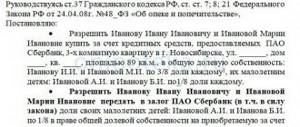What is guardianship and trusteeship?
Many people know first-hand what guardianship and trusteeship authorities are. But how do these two concepts differ? Both are legal forms of protection of property and personal non-property rights of citizens provided for by law, who are not able to fully or partially realize them on their own.
Guardianship is established over persons who have limited legal capacity, but guardianship is established over those who are completely incompetent.
The general characteristics of the guardianship and trusteeship authorities indicate that their competence includes cases when children, for one reason or another, are left without parental supervision, or a person is recognized by a court as incompetent or partially capable.
Although guardians and trustees are not legally equivalent to parents, they perform the same functions.
There are different models for the formation of the above-mentioned bodies, and the direct status of the guardianship and trusteeship bodies has undergone changes over time.
Guardianship, trusteeship and patronage: the essence of concepts
Guardianship is a form of ensuring the protection of the rights of citizens under 14 years of age who are left without parents (in the event of their death or deprivation of parental rights), as well as citizens recognized as incompetent for physical and mental health reasons, due to which they cannot be responsible for their actions.
Guardianship is a subtype of legal guardianship. Guardianship is established for partially capable citizens who are able to analyze their actions and be responsible for them, however, due to limited physical capabilities, they cannot provide themselves with a full life. These include: citizens aged 14 to 18 years (minors); citizens whose legal capacity was limited by the state due to abuse of bad habits (alcohol, drugs, gambling), which led to a deterioration in the financial status of the family.
Finished works on a similar topic
- Course work Guardianship, trusteeship and patronage 450 rubles.
- Abstract Guardianship, trusteeship and patronage 250 rub.
- Test work Guardianship, trusteeship and patronage 240 rubles.
Get completed work or specialist advice on your educational project Find out the cost
Patronage is a form of legal assistance for capable citizens. The peculiarity of this form of legal assistance is that it starts voluntarily. Namely, patronage is established or terminated on a voluntary basis, at the personal request of citizens in need of help (citizens with disabilities who are unable to independently resolve everyday and other vital issues).
Legislation
The main sectoral legislative act in this area is the Federal Law of April 24, 2008 No. 48-FZ “On Guardianship and Trusteeship”, which provides for the basic rights and responsibilities of PLO bodies and their terms of reference.
Certain issues are regulated by the Family and Civil Codes. The Guardianship and Trusteeship Committee is also guided by the following Federal laws:
- dated 06.10.1999 No. 184-FZ “On the general principles of organization of legislative (representative) and executive authorities of the constituent entities of the Russian Federation”;
- dated 06.10.2003 No. 131-FZ “On the general principles of organizing local self-government in the Russian Federation”;
- dated April 16, 2001 No. 44-FZ “On the state data bank on children left without parental care.”
Subjects of guardianship and trusteeship authorities
The list of entities that fall into this category is defined by law. As a general rule, these are executive authorities. At the same time, the legislator provides that local government bodies are also guardianship and trusteeship bodies in cases where they are vested with such powers.
Thus, depending on the region of residence, the structure of the OOP may change. If we take the Ministry of Guardianship and Trusteeship, then this role is played by the Ministry of Social Development, Guardianship and Trusteeship of a certain region.
Guardianship authorities may have their own inter-district administrations. Such a department, for example, was created in the Irkutsk region.
Other regions may create other organizations. Thus, in Samara there is a Department of Family, Guardianship and Trusteeship of the district, known as the Department of Guardianship and Trusteeship and Social Support.
Regardless of the name, all institutions solve the same problems. As a rule, functions are performed at different levels, but such units can be in each municipal district or in an intra-city entity. For example, the department of guardianship and trusteeship is often singled out among the structure of social service and population protection institutions.
Important issues relating to guardianship and trusteeship are sometimes decided by the head of the district or city administration at the place of residence of the person over whom they want to establish guardianship, or at the place of residence of the responsible person.
At the same time, minors deprived of parental care, as well as persons recognized by the court as incompetent or partially capable are also subjects of guardianship and trusteeship.
Powers of guardianship and trusteeship authorities
- identification and registration of citizens who need to have guardianship or trusteeship established over them;
- applying to the court to recognize a citizen as incompetent or to limit his legal capacity, as well as to recognize a ward as capable if the grounds on which the citizen was declared incompetent or was limited in his legal capacity no longer exist;
- establishment of guardianship or trusteeship;
- exercising supervision over the activities of guardians and trustees, the activities of organizations in which incapacitated or not fully capable citizens are placed;
- release and removal in accordance with this Federal Law of guardians and trustees from the performance of their duties;
- issuance, in accordance with this Federal Law, of permits to carry out transactions with the property of wards;
- conclusion of trust management agreements for the property of wards in accordance with Article 38 of the Civil Code of the Russian Federation; representation of the legitimate interests of minors and incapacitated citizens under guardianship or trusteeship in relations with any persons (including in the courts), if the actions of guardians or trustees to represent the legitimate interests of wards contradict the legislation of the Russian Federation and (or) the legislation of the constituent entities of the Russian Federation or the interests of the wards or if the guardians or trustees do not protect the legitimate interests of the wards;
- issuance of permission for the separation of trustees and their minor wards in accordance with Article 36 of the Civil Code of the Russian Federation;
- selection, registration and preparation, in the manner determined by the Government of the Russian Federation, of citizens who have expressed a desire to become guardians or trustees or to accept children left without parental care into the family for upbringing in other forms established by family legislation;
- checking the living conditions of wards, compliance by guardians and trustees with the rights and legitimate interests of wards, ensuring the safety of their property, as well as compliance by guardians and trustees with the requirements for the exercise of their rights and the fulfillment of the duties of guardians or trustees, determined in accordance with Part 4 of Article 15 of this Federal Law; informing citizens who have expressed a desire to become guardians or trustees or to accept a child left without parental care into a family in other forms established by family legislation, about possible forms of placing a child in a family, about the features of certain forms of placing a child in a family, about the procedure for preparing documents necessary to establish guardianship or trusteeship or placement of children left without parental care to be raised in a family in other forms established by family legislation, as well as assistance in the preparation of such documents;
- providing assistance to guardians and trustees of minor citizens in the implementation and protection of the rights of their wards.
Rights and responsibilities of guardianship and trusteeship authorities
First of all, the activities of the PLO are aimed at protecting the rights and legitimate interests of wards, providing them with a decent standard of living, as well as providing state support. In addition, their tasks include supervision of guardians and trustees, as well as control over the preservation of the property of persons under guardianship.
The tasks, powers, rights and obligations of the guardianship and trusteeship bodies are performed in accordance with the legislation of the Russian Federation. Among the most significant powers are:
- registration of persons who need assistance;
- a petition to the court to recognize a specific person as capable or incompetent;
- organization of guardianship in general;
- representing the interests of wards in court;
- mandatory participation of guardianship and trusteeship authorities in court and civil proceedings in the event of a divorce of spouses who have a common minor child and cannot determine which parent the child will live with in the future;
- conducting training for persons who have expressed a desire to adopt an orphan;
- monitoring the living conditions of the ward;
- release of guardians and trustees from their duties;
- issuing permits to conclude transactions related to the property of wards.
Among other things, the conclusion of the guardianship and trusteeship authorities on the possibility of being a guardian is important. In order to obtain it, you will have to go through a serious procedure.
The conclusion has a certain validity period - 24 months from the date of its issue for guardianship and 12 months for adoption. It is this document that is the basis for filing an application by a person wishing to become a guardian.
So, we can highlight the following functions of the guardianship and trusteeship authorities:
- identifying cases of orphanhood;
- transfer of children deprived of parental supervision to a foster family;
- protection of the rights and interests of orphans and incapacitated persons;
- providing children left without parental protection with decent living conditions;
- protecting the interests of wards during court proceedings.
If the life or health of a child is in any danger, who is obliged to notify the guardianship and trusteeship authority, it is the prosecutor. In addition, the OPP must immediately pick up the minor and provide him with temporary accommodation. No other individual or legal entity has such powers.
The legislation also provides for other powers of the above-mentioned bodies. Thus, the list of what the guardianship and trusteeship authorities do is very extensive.
Tasks of guardianship and trusteeship authorities
- protection of the rights and legitimate interests of citizens who need to establish guardianship or trusteeship over them, and citizens under guardianship or trusteeship;
- supervision over the activities of guardians and trustees, as well as organizations in which incompetent or partially incompetent citizens are placed;
- control over the safety of property and management of the property of citizens under guardianship or trusteeship or placed under supervision in educational organizations,
- medical organizations, organizations providing social services, or other organizations, including for orphans and children without parental care.
The guardianship and trusteeship authorities are also assigned other tasks in accordance with federal laws and the laws of the constituent entities of the Russian Federation.
Protecting the rights of children left without parental care
A child may lose parental care for various reasons:
- their death,
- long absence,
- refusal to fulfill parental responsibilities;
- restrictions on their implementation and others.
In such cases, the functions of protecting minors are assumed by the competent institutions.
The powers of guardianship and trusteeship authorities to protect the rights of minors are determined by law. When orphans are identified, they first look for existing relatives and provide the children with temporary housing.
In the future, the Family Code of the Russian Federation provides for the following forms of placement of children:
- adoption;
- transfer to guardianship or trusteeship;
- transfer to a foster family;
- placement in various institutions (educational, medical, social protection).
The activities of guardianship and trusteeship authorities to protect the rights of the child are aimed at registering orphans and monitoring the conditions of their detention.
Types of social assistance for orphans
The state provides every possible support to children who are left without parents. The form of support depends on where the minor is placed.
Thus, citizens who have taken children into their care are paid:
- one-time benefit;
- monthly payments for each minor;
- assistance that parents usually receive (until the child reaches the age of three, for a disabled child, and so on).
Protection of the interests and rights of orphans and children left without parental care is carried out by providing them with:
- benefits for travel in city or suburban transport;
- annual vouchers for sanatorium-resort treatment and health camps;
- housing under a rental agreement;
- specialized residential premises;
- free place in a hostel and so on.
Establishment and cancellation of guardianship
In order to take care of the favorable maturation of children who find themselves in a situation of deprivation of parental care, as well as to protect the civil rights of incapacitated adults, the state provides for the possibility of establishing guardianship and trusteeship over these citizens, which is adopted by decision of the guardianship authorities.
The regulation of the work of guardianship and trusteeship bodies occurs on the basis of diversified legal norms:
- norms of administrative law regulate the activities of guardianship and trusteeship authorities; on the basis of these norms, the relevant authorities decide on the appointment of guardians and trustees;
- family law norms are designed to regulate relations between guardians, trustees and wards;
- The norms of the Civil Code define guardianship and trusteeship as an independent independent civil law institution, and also establish the status of guardians and trustees and determine the nature of the participation of guardians in civil property relations that directly affect the wards.
Do you need proofreading or review of academic work? Ask a question to the teacher and get an answer in 15 minutes! Ask a Question
Guardianship and trusteeship are also carried out by: departments of education (over minors); health departments (over incapacitated citizens); social protection bodies of local executive bodies (over legally capable people in need of guardianship).
In Article 32 of the Civil Code We have already completed coursework
The concept and terms of the contract (according to Part 1 of the Civil Code) in more detail, the establishment of guardianship is provided for:
- over children under 14 years of age who are deprived of parental care;
- over incompetent citizens, if their civil status is recognized by the court.
Guardianship is established only from the moment the court decision on the citizen’s incapacity enters into legal force.
Note 1
According to Art. 27 of the Civil Code, guardians are the legal full representatives of the wards, therefore, guardians must carry out all household and civil transactions on behalf of the wards and only in their interests.
According to Art. 27 of the Civil Code, the guardian is held responsible for the health and development of minor wards; the guardian is held liable for offenses committed by the ward unless he proves that the offense was not committed through his fault.
The guardian is automatically deprived of the status of guardian when the minor ward reaches 14 years of age, or a court decision recognizing the citizen as legally competent and entering into legal force. Also, in the case of restoration of parental rights.
conclusions
Everything that is in one way or another connected with the protection of the rights of minors deprived of parental care or incompetent persons must go through the PLO. They are required to be involved when considering a case of deprivation of parental rights. The structure of organs in each region may differ, but they perform the same functions.
You can quickly find out the latest news in the social sphere thanks to the Internet. The main thing is to choose the right source. The official website of the Russian Federation (regional ministry or department) contains a lot of useful information for those who need help and who are interested in guardianship and trusteeship.










